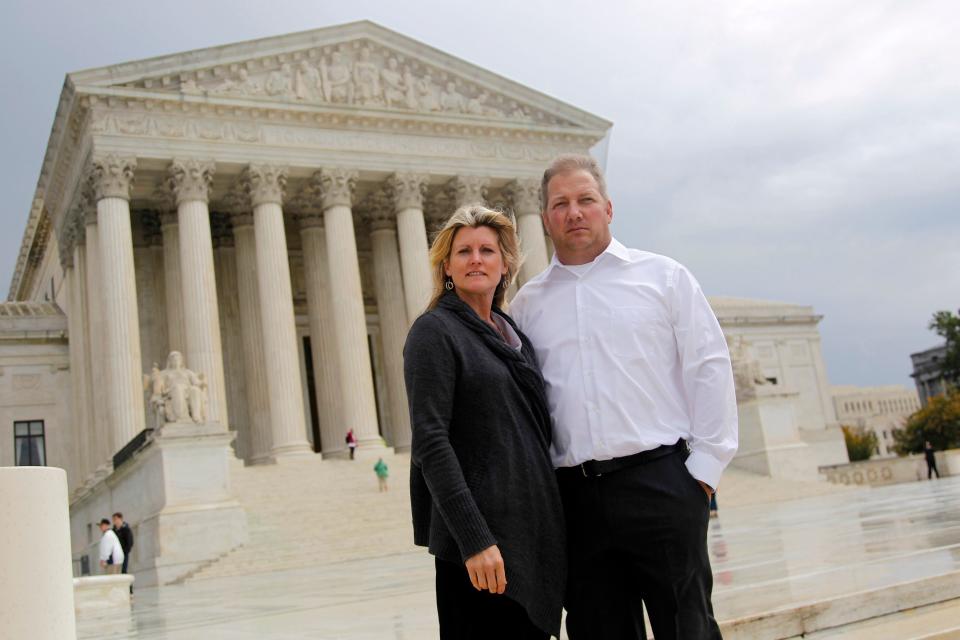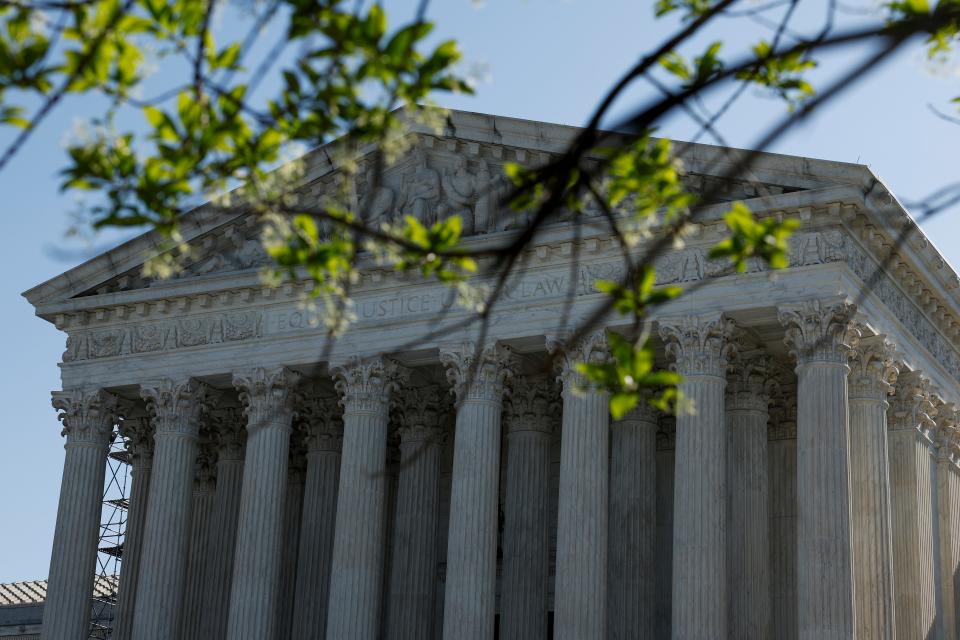As Supreme Court turns toward end of term, Americans battling the government are winning
WASHINGTON − A 94-year-old woman who lost her home, a student who could barely read after more than a decade of schooling and a couple fighting to build a house in Idaho all have something in common: They've all won recent unanimous Supreme Court rulings in their battles with local and federal government.
It is too soon to draw conclusions about the Supreme Court's current term, which is turning toward its finale next month, but the justices have so far sided with individual plaintiffs and businesses against the government in roughly seven of 10 non-criminal cases. While that may not be surprising for a court on which conservatives hold a 6-3 advantage, many of the early opinions have also drawn at least some support from the liberal wing.
Those include the case of a transgender Guatemalan woman fighting deportation, an Arizona company known for making the Taser stun gun that wants to sue the Federal Trade Commission and two neighbors in rural Montana who have been battling with the U.S. Forest Service for years over a road that runs through their property.
Case tracker: Race, religion and debt: Here are the biggest cases pending at the Supreme Court
In the shadows: Should Americans worry about the Supreme Court's 'shadow' docket? This expert says yes.
"We're talking about basic issues of fairness that, in a polarized era, I think do bring the entire court together," said Larry Salzman, director of litigation for the conservative Pacific Legal Foundation, which represented two clients who won their Supreme Court cases against the government this week.
The implications of some of the recent decisions have triggered sharp debates, perhaps none more so than the decision Thursday to significantly curb the ability of the Environmental Protection Agency to police pollution flowing into wetlands and small streams that feed into larger bodies of water. While all nine justices sided with the Idaho couple in their fight against the EPA, they split 5-4 on the standard that will be used in such cases going forward.
"It's going to be devastating for clean water protections throughout the country," said Nick Torrey, senior attorney with the Southern Environmental Law Center, who said much of the impact would hit disadvantaged communities.

"Wetlands are essential for protecting disadvantaged communities, which are often in low lying areas, from flooding," he said. "You're going to see those disadvantaged communities bearing the brunt of this decision."
Such heated disagreements about the impact of the decisions will almost certainly become more acute as the court wraps up its nine-month term in June, answering consequential questions such as whether universities may consider race in admissions, whether President Joe Biden's administration had the power to forgive an estimated $400 billion in student loan debt and whether the court will further weaken the Voting Rights Act in a case dealing with Alabama's congressional map.
Here's a look at some of the cases this term in which Supreme Court plaintiffs have beaten the government:

Fighting the government at the Supreme Court − and winning
In March, the Supreme Court sided with Miguel Perez, a student who is deaf and who sought to sue his school for damages over profound lapses in his education. Though the case was technical and involved whether he could sue for damages under one law even though he had not exhausted an administrative review under another, experts said the ruling could give parents and students more leverage to negotiate with schools.
The court unanimously sided Thursday with a 94-year-old woman who lost her home to foreclosure and then lost the equity she had in the property when a Minnesota county sold the property and kept the difference between what she owed in back taxes and the sales price. The Supreme Court ruled Geraldine Tyler had plausibly argued the county violated the Constitution's prohibition on government taking private property without compensation.
Also Thursday, the high court sided with a couple battling the Environmental Protection Agency for more than 15 years over a plan to develop a property they had purchased in the Idaho panhandle, a decision with potentially sweeping national ramifications for water quality and development.
Common theme? 'Significant concern' for property rights
The EPA case decided Thursday was the first the Supreme Court debated at the beginning of this current term, back in October. Tyler's case, about the equity in her condo sold by the county, was the last set for argument in late April. Although the cases dealt with vastly different legal issues, both involved clients challenging the government over property − a type of claim that has been viewed favorably by the high court in recent years.
"This is a court that cares about property rights," said Jonathan Adler, a professor at Case Western Reserve School of Law. "You see a significant concern for the impact of environmental regulation on landowners, and the impact of the government on property rights more generally."
EPA: 'Significant repercussions.' Supreme Court limits government power to curb water pollution
Property: Supreme Court sides with grandmother who lost home, equity because of back taxes
The EPA lawsuit turned on Michael and Chantell Sackett, who purchased their lot in a residential subdivision in 2004. The couple obtained county permits needed to develop the site but were informed by the EPA after they began construction that the agency viewed the land as subject to its review because it contained wetlands a few hundred feet from Priest Lake. In the Supreme Court's decision, a 5-4 majority set a new standard that will bar the EPA from regulating pollution unless the water at issue has a "continuous surface connection" that makes it indistinguishable from a larger body of water.
In another case decided in March, the court sided with two Montanans fighting the federal government over a road that runs through their property and that the Forest Service opened to the public. The government claimed a 12-year statute of limitations had run out but the Supreme Court, in an opinion written by Justice Sonia Sotomayor, allowed the case to continue. The neighbors were also represented by the Pacific Legal Foundation.

Looking ahead to June
The Supreme Court traditionally announces its most significant decisions in late June. And while cases like those filed by Perez and Tyler may unify many on the left and right, the upcoming rulings − such as a challenge to Biden's student loan program and the use of affirmative action − are far more likely to divide the court and the nation.
One of those cases involves Gerald Groff, a former U.S. Postal Service employee and evangelical Christian who wanted to take Sundays off for church and rest. That presented a scheduling conflict – and a burden on his colleagues, the government argued – after the Postal Service started delivering Amazon packages on Sundays. Some of the court's conservatives appeared sympathetic to Groff during oral arguments last month.
Several African American voters, meanwhile, are at the center of a lawsuit challenging Alabama's recently redrawn congressional map, in a case that will be decided next month. The state's map includes one district out of seven with a majority of Black voters – even though African Americans make up 27% of the state's population. The case could have sweeping implications for whether and how states take account of race as they draw congressional districts.
This article originally appeared on USA TODAY: Divisive Supreme Court wetlands decision is win for property rights

